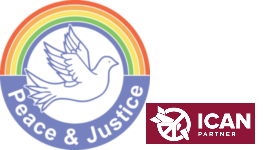Saturday 19th October
2.00-2.50 pm Conference Opening
Interview with Zainab Bangura, Special Representative of the UN Secretary
General on Sexual Violence in Conflict.
2.55-4.00 pm Unheard Voices in Conflict
Interviews will be held with speakers with experience of conflicts in Scotland, Africa, Europe, and the Middle East.
4.00-4.30 pm Refreshment break
4.30-5.30 pm Discussion Session 1: Troubling Voices over Rights and Wrongs
1 Violence, rights and obstacles to peace discussions
What are the conditions for advancing peace discussions in conflicts marked by continuing violence? In conflicts marked by struggles over rights, what role is there for peace initiatives framed in rights language? This session includes input from experienced negotiators from unofficial peace tracks on more than one continent.
2 Mediation, rights and wrongs
How can peacebuilders help communities affected by conflict to negotiate grievances? With specialist input from local practitioners engaged with sectarian conflict, this session will explore the challenges of mediation work.
3 Voices and imposed silences in conflict situations:
What prevents voices in conflict situations from being heard, and what happens when the voices of those affected by conflict are silenced? With specialist input from an EPI member with experience of the conflict in Bosnia, this session will explore the role of local voices in reconciliation work.
4 Economics, voice and conflict
What role is there for conversation across conflicts defined by opposing economic and social interests? With input from experts on indigenous rights and mining interests, this session will explore the connection between economics, voice and conflict.
5.30-6.00 pm Refreshment break
6.00-8.00pm Film: A Tale of Two Syrias (2012)
A chance to see a film by award winning independent filmmaker Yasmin Fedda.
The film showing will be followed by a discussion with one of the film’s producers.
Sunday 20th October
9.30am-12.30 pm Practical Workshops:
• Listening as a Peacebuilding Skill, Stage 1
• Consensus Based Decision-Making
11.00-12.30 am Networking for practitioners and specialists
11.00-12.15 am UNA Service for United Nations Day, St Giles
12.30-1.45 pm Light lunch reception
Sunday 1.45-2.50 pm Discussion Session 1: Realism, Rights and Voices
1 Realism and idealism in peacebuilding work
What role do realism and idealism play in professional peacebuilding work? This session will include input from experienced conflict transformation specialists, civil society figures and from you.
2 Pacifists and realism
What is pacifism, and does it represent a realistic approach to conflict in the twenty-first century? What is the role of realism in defining pacifist approaches to armed conflict and other types of violence. This session will open a discussion about the strengths and weaknesses of pacifist approaches to conflict.
3 Realism and the Just War idea
What is a realist approach to conflict, and how does the Just War idea differ? What does the just war tradition have to offer? This session explores the strengths and weaknesses of realist and just war approaches to conflict.
4 Representing voices in conflict
With specialist input from an expert on the conflict in Northern Ireland, this session explores the role of symbolism and the arts in representing the voices of those in conflict.
Sunday 2.55-4.00pm Discussion Session 2: Moral Outrage
1 Crimes against humanity, peace and integrity
With specialist input from speakers with personal and professional experience of situations marked by crimes against humanity, this session will explore the relationship between outrage and the need for peace and security in fragile post-conflict societies.
2 Peacebuilding in the face of moral outrage
This facilitated discussion session explores the challenges of peacebuilding in conflicts that evoke a high degree of controversy or moral outrage, with a special focus on Israel–Palestine.
3 Moral outrage, solidarity and intervention
Public moral outrage is an important factor in governments’ decisions about military intervention in foreign conflicts. This session explores the role of moral outrage in arguments for and against military intervention, and what it means to be in solidarity with societies in conflict.
4 Voices of outrage and peace in the public sphere
What happens when public debate becomes dominated by moral outrage? How do voices promoting outrage or promoting peace fare in the public sphere? This session is an opportunity to explore the challenges of democratic debate, with a special contribution from an expert on US politics and media coverage.
4.00-5.15 pm Tea followed by brainstorming on international, local, dialogue and education based approaches.
Edinburgh Peace and Justice Centre is a member of the Edinburgh Peace Initiative.
EPJC Coordinator Brian Larkin will lead sessions on Consensus Based Decision Making and Pacifism and Realism
Participation in the conference is completely free and it is open to members of the public. To register for all or part of the conference, email epi.edinburgh@gmail.com
Voices in Conflict: Rights, Realism and Moral Outrage
Conference Programme
19-20 October 2013
Sunday 20th October
9.30am-12.30 pm Practical Workshops:
• Listening as a Peacebuilding Skill, Stage 1
• Consensus Based Decision-Making
11.00-12.30 am Networking for practitioners and specialists
11.00-12.15 am UNA Service for United Nations Day, St Giles
12.30-1.45 pm Light lunch reception
1.45-2.50 pm Discussions: Realism, Rights and Voices in Conflict
See programme insert for details of the following sessions:
1 Realism and idealism in peacebuilding work
2 Pacifists and realism
3 Realism and the Just War idea
4 Representing voices in conflict
2.55-4.00 pm Discussions: Moral Outrage and Voices in Conflict
See programme insert for details of the following sessions:
1 Crimes against humanity, peace and integrity
2 Peacebuilding in the face of moral outrage
3 Moral outrage, solidarity and intervention
4 Voices of outrage and peace in the public sphere
4.00-5.15 pm Tea followed by brainstorming on international, local, dialogue and education based approaches

